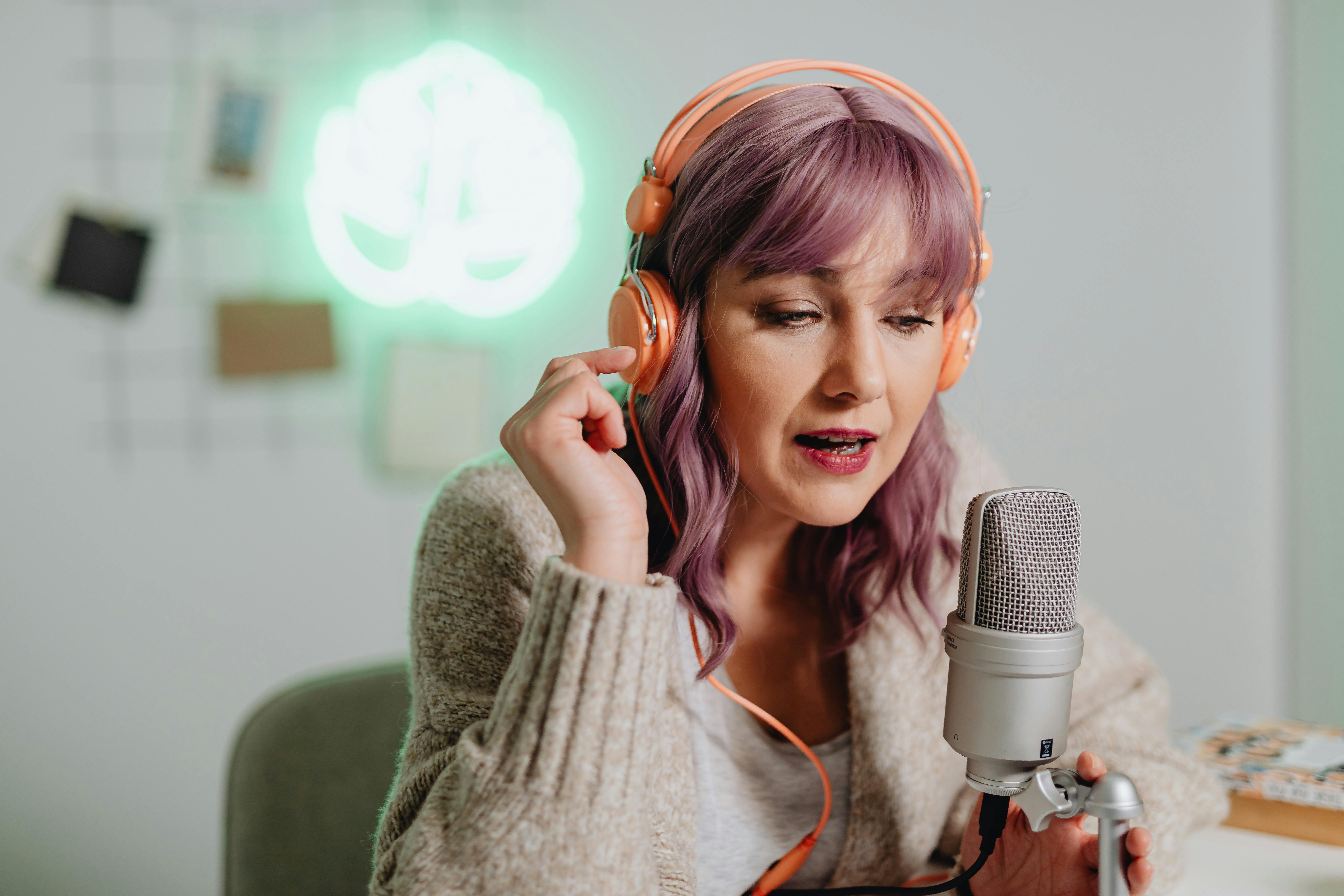If you are seeking to increase your bottom line, you should consider having your own podcast. When you have your own podcast you will grow your online visibility and become a leading authority in your niche. Podcast are a huge component of visibility marketing.
A lot of people are listening to podcasts these days. Are you one of them?
When people discover a podcast that they really like they will tune in all of the time and consume all of the new podcasts that the creator publishes. This is an excellent opportunity to make money, grow your online visibility and increase your bottom line.
Podcasts are very convenient. They are available in MP3 format and listeners can use their smartphones or tablets to listen to them. You can listen to a great podcast in your car but you
cannot watch videos when you are driving.
People also listen to podcasts when they are working out, doing the shopping, travelling on trains and buses – in fact anywhere!
A lot of marketers try to create successful podcasts but fail to achieve this. They make a lot of mistakes and don’t have the patience and determination to see the project through.
In today’s post and the following post, I will tell you how to avoid these mistakes and create successful profitable podcasts that listeners will love.
Secret 1 – Choose the Right Podcasting Niche to Increase Your Bottom Line
This is the most important secret to successful podcasting and to increase your bottom line. If you choose the wrong niche then you are doomed to failure right from the start and all of your efforts will have been for nothing.
You need to choose a niche where there is a good demand for content and there is enough content opportunities for you to create a number of different podcasts for a long time. The
commercial opportunities that exist in the niche are also important to increase your bottom line.
You will read everywhere that you need to choose a niche for podcasting that you are passionate about. While it is a good idea in principal you need to test whether there is demand
for the podcasting niche before you go ahead with it.
The easiest way to do this for free is to use the Google Keyword Planner. All you need is a free Google Adwords account and you can access the planner. By using the Google Keyword Planner you will be able to see how many people are searching for information on your niche using the Google search engine.
When you use the Google Keyword Planner you will also receive suggestions for related keywords. This will really help you to determine the different subjects for your podcasts to increase your bottom line.
Start by using a seed keyword e.g. “dog training” and see how many searches there are per month. If there are many thousands then you are on to a winner.
Monetize Your Podcasts to Increase Your Bottom Line
There are a number of ways that you can monetize your podcasts to increase your bottom line. A good way is to recommend products and services that are a good fit for the subject of your podcast.
So if your podcast was about email marketing for example you could recommend your own course (if you have one) or someone else’s as an affiliate.
It is worth checking to see the level of commercial opportunity for your niche ideas in your quest for profitable podcasting to increase your bottom line.
Go over to Clickbank.com and see if there are any digital products for your niche. You can also check for physical product opportunities by searching on Amazon.com.
Find a Passionate Niche
The ultimate niche for profitable podcasting is one that you are passionate about and has great demand, a lot of different subjects for podcast creation and good commercial opportunities. If you decide to go with a niche that you are not passionate about then you can learn everything that you can about it and develop a passion for it.
Having a passion for your niche is extremely important with podcasting. Listeners will be able to detect the passion, or lack of it, in your voice. This is pretty difficult to fake so a genuine interest is always required.
Take your time to come up with niche ideas and validate them all using the Google Keyword Planner.
You can start by listing your interests and passions and then adding subjects that you are good at or have skills in. For instance you may have mastered a particular skill through your work that you can speak about as an expert.
You can also visit other websites for niche ideas.
Here are some good ones to take a look at:
- Clickbank.com
- Amazon.com
- Magazines.com
- Dummies.com
When you go to these websites take a look at the various categories and sub categories for inspiration. If there are products being sold on these websites then this is a pretty strong indicator that there is demand for information in the niche. Always check this using the Google Keyword Planner.
Secret 2 – Get the Right Equipment for Podcasting
It is absolutely not a good idea to use the microphone in your laptop, smartphone or the one that is attached to those cheap headphones for your podcast recordings. They tend to be very inferior and the sound quality of your recordings will be very poor.
When people listen to your podcasts they will give up on them quickly and leave negative reviews.
Microphones
You must invest in a good quality microphone for your recordings to grow your online visibility. Borrow one if you have to. When people listen to your podcasts they will judge them on the content that you are providing and the sound quality.

Never create podcasts with poor sound quality. There is only so much that you can do with an audio editing application.
When you are thinking about the equipment that you need for podcasting you need to think long term.
If you are going to provide mostly solo recordings then go for a USB microphone like the Blue Yetti that you can plug into your computer.
If you want to invite guests to your podcasting studio then invest in XLR dynamic microphones.
Whether you are going to buy a number of good quality microphones or just one, you should always get a pop filter and a stand or boom arm as well. A pop filter will make your recordings sound a lot better and the stand will help you with positioning the microphone so that you can record your voice properly.
For a mini podcast studio you should get a mixer and a digital recorder. You will also need boom arms for all of the microphones. This is quite an investment so you may want to progress to this later on once your podcasts are successful.
Headphones
We also recommend that you invest in some good quality headphones to grow your online visibility. Yes you can record a podcast without using headphones but you won’t know how good or bad it sounds until you play back the recording. With headphones you can monitor sound quality in real time.
You will need a good audio editing application for your recordings. It is inevitable that you are going to make mistakes especially in your first few recordings.
Fortunately there are two really good audio editing suites that are totally free for Windows and Mac computers:
- Windows users can use Audacity
- Mac users can use Garageband
These applications will take care of all of your audio editing needs. There are others that cost money but they are really not necessary to get going. You can easily add intro and outro music, sound effects and more with these two audio editing suites. When you are done with your recording you can mix everything down and create an MP3 file.
It is also possible to record podcasts on a smartphone or tablet device. To do this you will need a high quality microphone that clips on to your lapel or tie. These are available from Amazon for around $50. You will also need a recording app and there are many free ones available for both Android and iOS devices.
Although you can edit your podcasts on your smartphone it can be a bit tricky with the small screen. We recommend that you create an audio file on your mobile device and then use your
computer for the editing work.
Another thing that you will need for your podcasts is some good cover art. You will use this on your podcast page and on the podcast directories and other pages to identify your brand. If you are not great at graphic design then find someone on Fiverr.com and pay them a few bucks to do a good job for you.
Finally we recommend that you use a podcast hosting service for your podcast files. You may have a web hosting account that has unlimited disk space but this is for web files and not for audio files.
A good podcast hosting service will store your files for a small fee each month and provide you with an RSS link for your podcasts. More on this later.
Secret 3 – Create a Plan for your Podcasts to Increase Your Bottom Line
If you are an expert in your chosen podcasting niche then it can be tempting to just “wing it” and record podcasts on the fly. These rarely work out well.
There is always pressure when you are recording so you may miss a number of important points and also mumble a lot. Not a good experience for your listeners!
Scripts for Your Podcasts
When you are starting out we recommend that you create a full script for each podcast. You can then read from this when you are recording. By doing this you won’t forget anything and you will be less likely to mumble.
After a while you can progress to “prompt” scripts where you just work off of a list of prompts to remind you of what you need to talk about.
Zoom for Interviewing the Experts
It is a good idea to interview some experts in your niche and turn these into podcasts. You can set up a call using Zoom and then record the conversation. Zoom will produce a recording in both video and audio formats.
Sometimes with Zoom calls one of the participants is recorded a lot louder than the other. There are Zoom call recording apps that will help you make the necessary adjustments.
Zoom is more like video conferencing and you set up a room and send out an invite to your interviewee. Zoom calls are always recorded and you will receive this after the call ends. There are free plans and paid plans with Zoom and the recording quality is usually really good.
If you are going to interview an expert using an online call then plan this in advance for the best results. Agree a list of questions with the interviewee before you conduct the interview. This gives the interviewee time to prepare and you will get a better quality interview overall.
You need to be committed with podcasting and be prepared to launch new podcast episodes on a regular basis. Some podcasters publish every day. We recommend once a week or once a fortnight. Whatever publishing frequency you choose be sure to stick to it.
Use a calendar tool to get everything organized. The free Google Calendar does a really great job and is really all you need.
You can schedule days for research and preparation as well as podcast recording. With Google Calendar you can add descriptions and notes and also attach files. Consistency is really important with profitable podcasting.



Leave a Reply